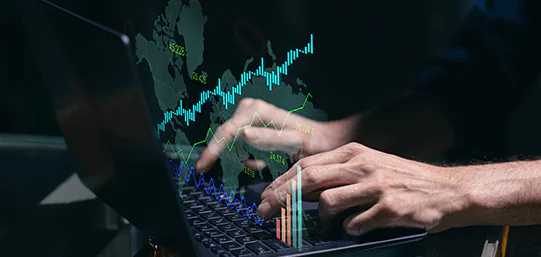Soluciones Zelvo


Soluciones Zelvo makes learning about investment easy by linking people to suitable investment tutors. We're all about connecting users with financial education sources to improve their investment know-how. Our goal is to empower people to make informed financial decisions.
Soluciones Zelvo is the starting point for financial literacy. Whether one is just starting or a seasoned investor, we connect people with instructors who offer personalized tutoring.
At Soluciones Zelvo, we team with investment education firms that provide the vital ingredients and roadmaps for an educational journey in the investment world. Plus, becoming a member of Soluciones Zelvo won't cost a dime, ensuring anyone can start their investment education journey without any financial barriers holding them back.


After registering on Soluciones Zelvo, individuals are linked with investment education firms that will offer continuous assistance and clarification throughout their learning journey.
To get set up with a suitable education firm, fill out the registration form with accurate information.
After signing up with Soluciones Zelvo, investment education providers stand ready to assist the new user. A representative will ask about the user's background and interests, tailoring the learning journey to match their goals and requirements.
The representative from the assigned investment education firm takes proactive steps to reach out and reassure the new user. They address any questions or concerns the users may have before embarking on their journey. It's done through a brief phone call that's aimed at giving clarity for the journey ahead.
Similarly, this rep will ask the user some questions. This conversation aims to identify the appropriate path for their learning journey. Acknowledging that the first step for a seasoned investor differs from that of a newcomer, this dialogue is crucial for customizing the user’s learning experience.


At Soluciones Zelvo, signing up is a breeze, making it easy to connect with investment education providers quickly. Plus, all our services are free; one can tap into suitable resources and training hassle-free!
Personalized Help and Quick Assistance: Upon registering on Soluciones Zelvo, someone from the investment education firm will reach out immediately to give them tailored support to have a personalized path to grasping investment complexities.
Asset allocation strategies refer to a process where an investment portfolio is distributed across various asset classes, such as stocks, bonds, cash, real estate, and alternative investments, based on factors like risk tolerance, investment goals, time horizon, and market conditions. The goal is to balance risk and return to pursue one’s objectives. Soluciones Zelvo serves as a bridge, linking people to insights and education on asset allocation. Below are six asset allocation strategies:

Private equity (PE) and venture capital (VC) are both forms of investment in privately held companies. However, they operate in different stages of a company's lifecycle and target different types of businesses. The former refers to investments in more mature companies with established operations and cash flows. PE firms acquire these companies through buyouts or taking significant stakes in them. Soluciones Zelvo connects users with educators to gain an understanding of these investments.
The goal of private equity is often to improve the company's performance, streamline operations, and ultimately increase its value for several years. Risks include operational risk, market risk, and the risk of underperformance. On the other hand, venture capital focuses on investing in early-stage or startup companies the investor expects to have high chances of growth. Soluciones Zelvo's associated investment education firms provide people with resources to learn about PE and VC.
VC firms provide financing to these companies in exchange for equity ownership, usually in preferred stock. The ultimate goal for venture capitalists is to invest in companies that may become market leaders in their respective industries and yield significant returns upon exit. Soluciones Zelvo helps individuals gain access to investment educational materials that explain PE and VC.

Global economic trends refer to the overall direction and performance of the world economy. Key indicators include GDP growth, inflation, unemployment, interest rates, and trade balances. These trends can influence market sentiment, corporate earnings, and investor confidence.
Soluciones Zelvo understands this knowledge is significant, so users are connected with a firm to gain knowledge from suitable investment educators. Below are some of the global economic trends:
Economic growth is a fundamental driver of market performance. High GDP growth rates indicate a healthy economy, leading to increased consumer spending, corporate profits, and investment opportunities.
Inflation refers to the rate at which prices for goods and services rise over time. Central banks closely monitor inflation and adjust interest rates to try and maintain price stability.
Unemployment rates reflect the health status of the labour market and consumer confidence. Low unemployment rates indicate a strong economy with high consumer spending and corporate profitability, which can support stock market performance. A rising unemployment rate means the opposite.
Trade balances, which measure the difference between a country's exports and imports, can impact currency values and trade relationships between nations. Trade policies like tariffs and agreements can affect international trade flows, corporate supply chains, and global economic growth.
Quantitative finance is a field that combines mathematical modeling, statistical analysis, and computer programming to analyze financial markets, securities, and investment strategies. It encompasses a range of quantitative techniques and methods used by financial professionals, including investment banks, hedge funds, and asset management firms, to make data-driven decisions and manage risk. Soluciones Zelvo presents an easy way for individuals to learn more about these concepts from investment education firms.
Algorithmic trading, also called algo trading or automated trading, is a form of quantitative trading that utilizes computer algorithms to execute trading orders automatically based on predefined criteria or instructions. These algorithms can analyze market data, identify trading opportunities, and execute trades quickly, often without human intervention. Algorithmic trading demands cutting-edge technology that only big market players have access to. Retail traders can learn more about this for more insight into the practices of institutional investors.

Retirement planning involves setting specific financial goals, estimating future expenses, and developing strategies to try and accumulate savings. It may help to provide income during retirement. It typically begins with determining retirement income needs based on factors such as current expenses, expected lifestyle in retirement, healthcare costs, inflation, and life expectancy. Soluciones Zelvo understands the need for this skill. Therefore, we connect people with investment educators.
Investing for retirement involves selecting appropriate investment vehicles and asset allocation strategies to try and grow retirement savings over time while managing risk. Common investment options for retirement include stocks, bonds, mutual funds, exchange-traded funds (ETFs), real estate, and other alternative investments.
Registering on Soluciones Zelvo for free allows one to connect with investment education firms to learn more about investing.

Stock-specific analysis, or fundamental analysis, involves evaluating individual stocks based on their underlying financial and qualitative factors to determine their intrinsic value and prospects for investment. This analysis focuses on understanding the company's business model, financial performance, competitive position, etc. Soluciones Zelvo is positioned to help anyone learn more about this concept from suitable investment education firms. Registration is free.
It involves examining the company's financial statements, including the income statement, balance sheet, and cash flow statement, to assess its liquidity, solvency, and overall financial health.
Valuation analysis aims to determine whether a stock is overvalued, undervalued, or fairly valued relative to its intrinsic value. Common valuation methods include price-to-earnings (P/E) ratio, price-to-book (P/B) ratio, dividend yield, discounted cash flow (DCF) analysis, and comparable company analysis (CCA).
Qualitative factors such as the company's competitive advantages, industry dynamics, market positioning, brand reputation, product innovation, and management team are also considered in stock-specific analysis.
Assessing risks and possible catalysts that could impact the company's future performance and stock price is an important aspect of stock-specific analysis. Risks may include industry-specific factors, regulatory changes, macroeconomic conditions, etc. Catalysts are new product launches, strategic initiatives, mergers, etc.
Assessing the quality of the company's earnings involves examining the sustainability and reliability of its reported earnings.
Evaluating a company's dividend history, dividend payout ratio, and dividend yield helps assess its commitment to returning value to shareholders. A consistent dividend payment track record and sustainable dividend policy may indicate financial stability and shareholder-friendly management.
Diving into financial education can be overwhelming, like swimming in a sea of too much information. But don't worry. Soluciones Zelvo is here to the rescue, connecting people directly with investment educators for structured and personalized learning experiences.

| 🤖 Entry Fee | No entrance fee |
| 💰 Incurred Costs | Free of any charges |
| 📋 Process of Joining | Registration is streamlined and fast |
| 📊 Subjects Covered | Education on Crypto assets, Forex markets, and Investment strategies |
| 🌎 Eligible Countries | Almost all countries are supported except the US |


